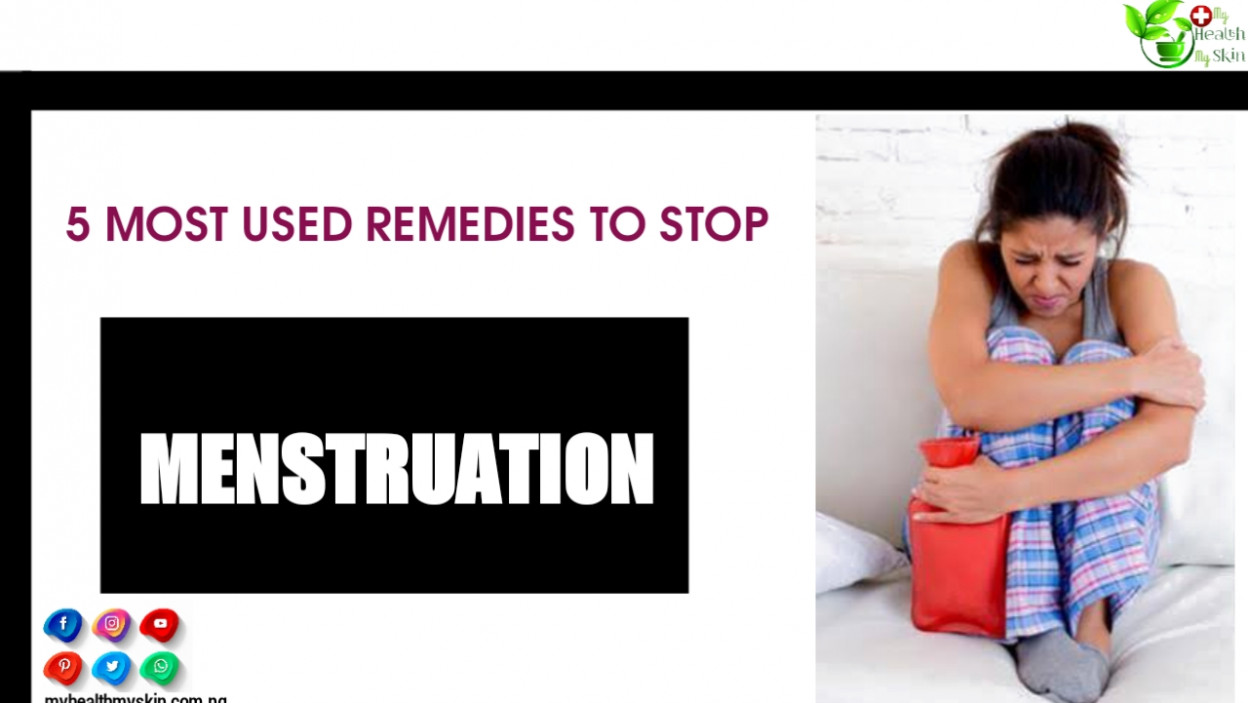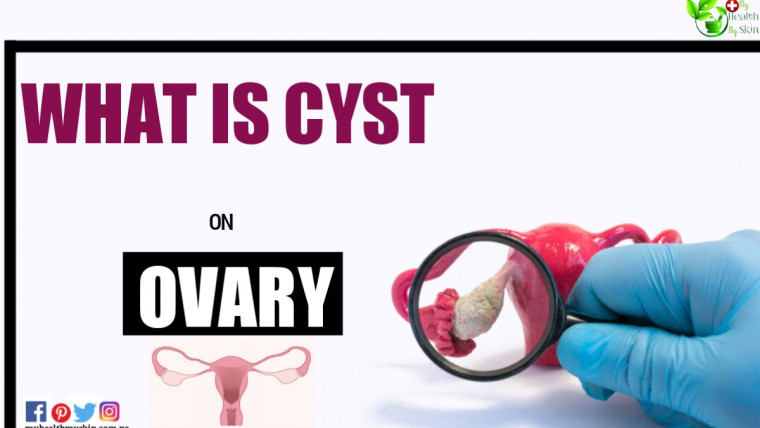For some women, the menstrual period can bring a number of problems, so it is important to know the home remedies to stop menstruation.
These problems can range from a simple headache to excessive blood loss and other disorders such as anemia.
So, below we will know the main remedies to stop menstruation, and some tips on how to reduce the discomforts of this period.
[lwptoc]
What Is Menstruation (Period)?
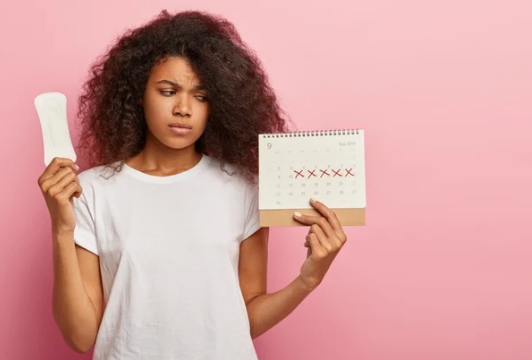
Menstruation or Period is a normal process of the body, and it is part of the female reproductive cycle. This cycle involves the release of several hormones, in a synchronized way, which is repeated every month.
It occurs because the female body prepares for pregnancy, and when this does not occur, the endometrium, which is a highly vascularized tissue, breaks off, causing blood loss.
When To Stop Menstruation?
Women who have heavy menstrual cycles are the ones who are most looking for methods to reduce menstrual flow, although this is not the only indication. The most common are:
- Anemia;
- Endometriosis;
- Some types of uterine fibroids.
And there are even cases in which the woman herself wants to stop menstruating, either for a short time or for a longer period.
Therefore, this decision must be taken together with a gynecologist, who will evaluate the indications and offer the best options for each case.
Most Used Drugs To Stop Menstruation
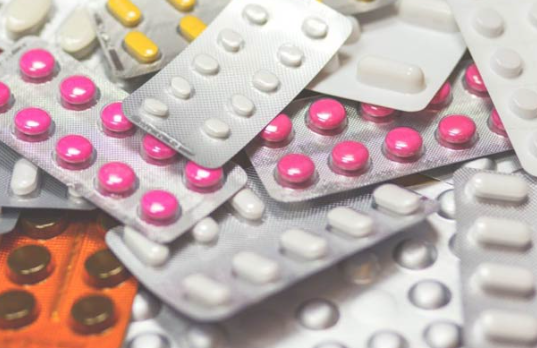
To date, there are no safe and effective ways to stop menstruation after it has started. In addition, in most cases there is a period of bleeding reduction before the bleeding stops completely.
So, let’s get to know the five most used drugs to stop menstruation, and understand how they work.
1. Intrauterine Device
Despite being a physical device placed in the uterus, there are some types of intrauterine device (IUD) that release hormones in small amounts directly into the uterus.
Because of this, medicated IUDs can help to reduce the thickness of the lining of the uterus and, as a result, decrease or stop menstrual flow.
2. Primosiston
Primosiston is a drug indicated to treat cases of heavy uterine bleeding and also to promote the anticipation or delay of menstruation.
But for each of these indications, the way of using the drug is different, and its use must always be prescribed and guided by a doctor.
3. Norethisterone
It is a progestogen hormone used in the treatment of:
- Treatment of dysfunctional uterine bleeding and menstrual cycle disorders;
- dysmenorrhea;
- Premenstrual tension;
- Pelvic pain;
- Fertility disorders due to progestin insufficiency.
Thus, it can be used in some cases where menstrual bleeding is very heavy, whether or not it is associated with pain and other symptoms.
4. Progestogen
This synthetic hormone has progesterone-like effects and is usually available as a standalone mini-pill. It works by stabilizing the lining of the uterus and making it thinner.
Thus, continued use of this hormone prevents the lining of the uterus from thickening, causing menstruation to stop or menstrual flow to be very light.
5. Contraceptives
Birth control pills release synthetic hormones with a structure similar to estrogen and progesterone. These hormones work by regulating the menstrual cycle and stabilizing the lining of the uterus, preventing it from thickening.
Continued use of certain oral contraceptives stops menstruation completely, while others may require a break in order for menstruation to occur lightly and on a schedule.
And, in addition to pills, there are contraceptives in other presentations, such as patches, rings and injections that can be applied every 1 or 3 months.
So, it is important to consult a gynecologist, who will help you define the most suitable contraceptive for each case.
What About Tranexamic Acid?
Tranexamic acid is an antifibrinolytic agent, which means it prevents clots that have already formed from dissolving. That is, the drug does not stimulate blood clotting, but rather prevents clots from being broken.
So, yes, it can reduce menstrual blood loss, but it won’t stop menstruation from occurring.
Can Anti-inflammatories Stop Menstruation?
While there is a chance that using high doses of anti-inflammatory drugs can stop or lessen the intensity of menstruation, this practice is not recommended by doctors because of the risk of side effects such as kidney and liver damage.
However, these medications are often used during menstruation to relieve pain related to cramps. Some examples are:
- Ibuprofen;
- Mefenamic acid;
- naproxen.
Tips To Regulate Your Period Naturally

Although there are no ways to stop menstruation naturally, we have separated some tips that can contribute to the health and regulation of hormones, which can alleviate some symptoms related to this period. Are they:
Exercise Regularly
Although some women still believe that exercising during menstruation can be harmful, in fact cardiovascular exercises help relieve discomfort and encourage menstrual flow.
Additionally, exercise reduces fluid retention, which relieves symptoms like bloating and cramping.
Maintain A Healthy Weight
Excess weight can change hormonal rates, and consequently affect menstrual flow. This is because the fat cells themselves produce certain hormones, and when in excess, they affect the entire body.
Therefore, maintaining a healthy weight can, in addition to improving your health, contribute to lighter and shorter menstrual flows.
Hydrate
Proper hydration relieves many symptoms that come with menstruation, such as cramping and back pain. In addition, good hydration helps to reduce fluid retention.
Healthy Eating
Eating nutritious foods is essential for good health, and some studies show that adequate intake of certain nutrients can contribute to relieving cramps and PMS symptoms, as well as making menstrual periods lighter.
Important nutrients for this to happen are zinc, magnesium, vitamin B6, vitamin C and iron.
In addition, foods like ginger can have an anti-inflammatory effect, and help reduce common discomforts of this period.
Other Ways To Manage Menstruation
While the symptoms associated with menstruation are different for every woman, a few changes can help alleviate some of them, such as:
- Adhere to menstrual cup: The menstrual cup is a silicone cup that can be fitted inside the vagina to collect the blood released during menstruation. It hardly leaks as it holds a lot of blood, in addition to being reusable;
- Use a heating pad: While it won’t make the flow less intense, applying a heating pad or warm compress can relieve menstrual cramps;
- Purchase an absorbent panty: Absorbent underwear can greatly reduce the discomfort caused by using a regular sanitary napkin. Those who wear it guarantee that, in addition to being easy to wash and use again, the panties are extremely absorbent, safe and comfortable.
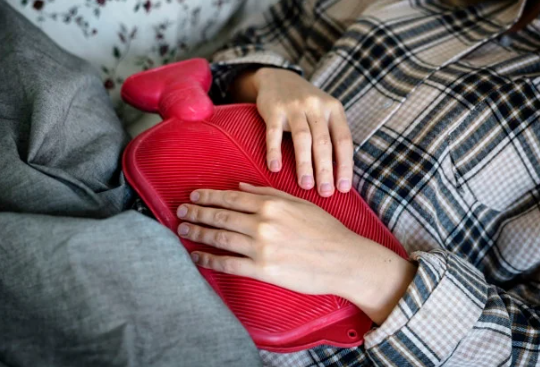
Is It Safe To Use Medication To Stop Menstruation?
According to information from the National Women’s Health Network , a network made up of thousands of members focused on women’s health, there is no evidence that stopping menstruation harms health. However, while all the methods to stop menstruation described above have their benefits, they also have their risks and side effects.
Many hormonal medications, whether in pill, IUD or injectable form, can cause a range of side effects, such as:
- Irregular bleeding that can last for several months;
- Acne;
- Breast pain, also known as breast tenderness;
- Malaise;
- Headache;
- Nausea;
- Mood changes;
- Decreased libido.
Thus, it is strongly recommended to go to the gynecologist at least once a year to assess hormone levels and perform imaging tests, in order to avoid adverse drug reactions as much as possible and diagnose possible problems as quickly as possible.
Tips And Care
It is normal to experience some discomforts during your period, such as headaches, cramps and fluid retention. However, when these symptoms begin to affect the quality of life, it is necessary to undergo a medical evaluation, in order to discover the best way to treat the problem.
Also, never use medication without medical advice, as potentially dangerous side effects can occur, in addition to the risk of worsening health problems.
If you want to read more articles similar to 5 Most Used Remedies To Stop Menstruation, we recommend you visit our Women’s Health category.
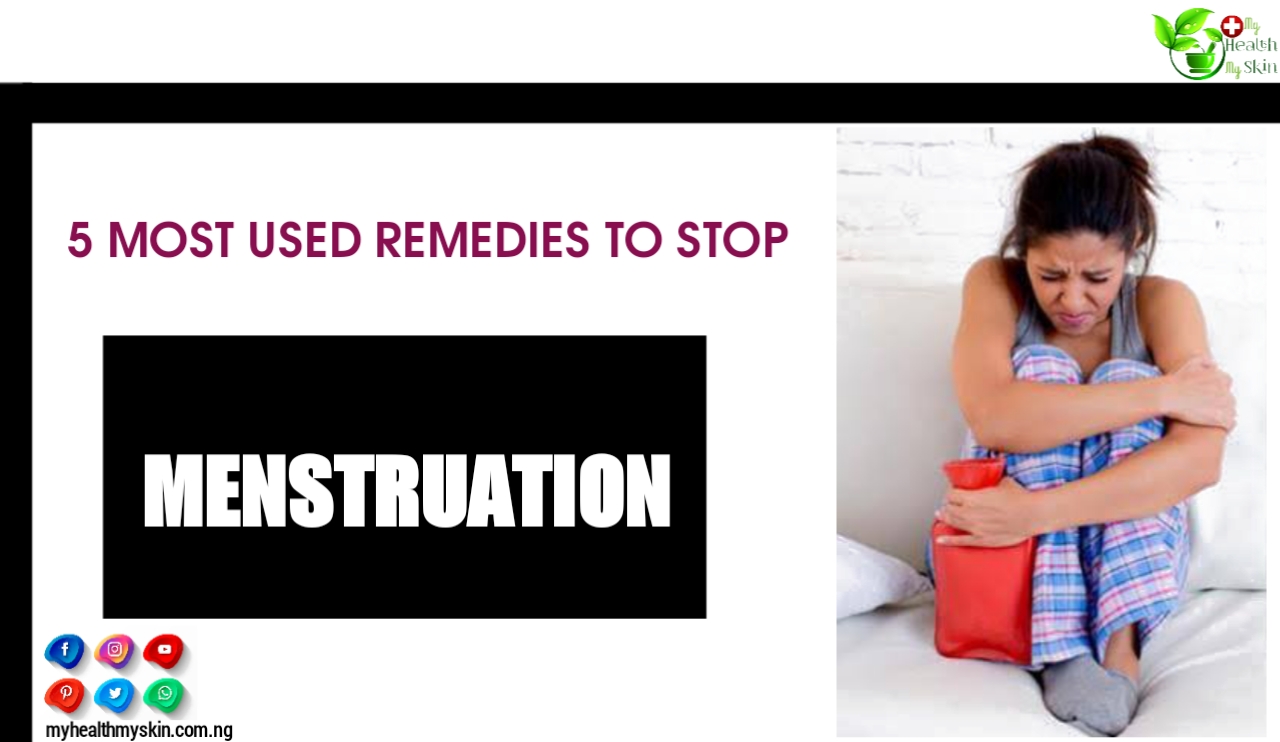
Did You Already Know The 5 Most Used Remedies To Stop Menstruation? Have You Tried Any? Comment Below!

